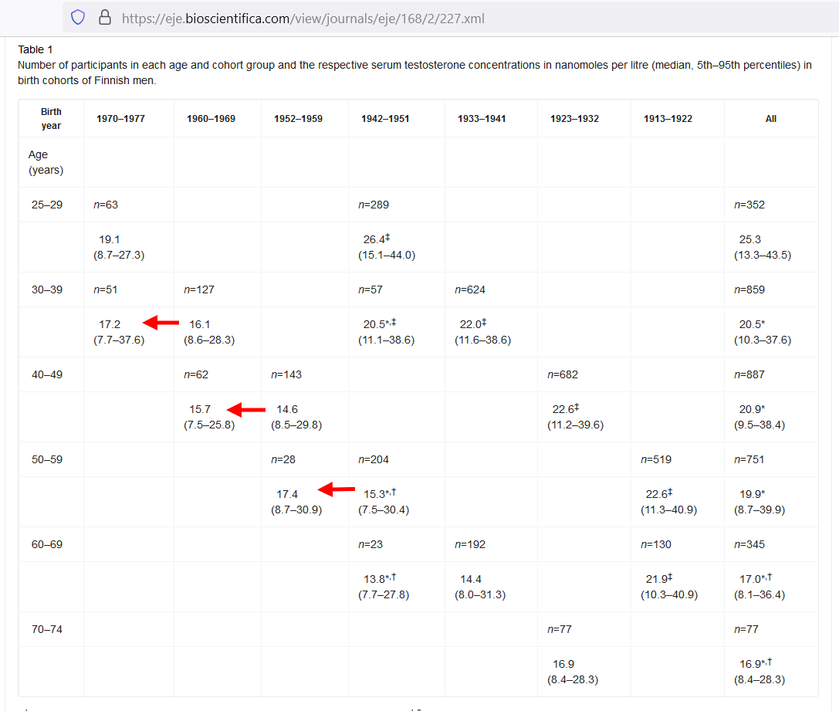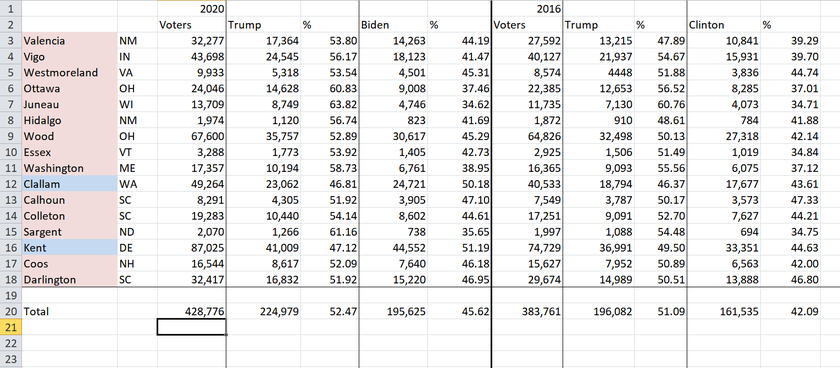
The main claim: There has been a global continuous decline in testosterone (during the last 50 years). The reasons mentioned may vary: the pandemic, environmental factors, vaccinations, smoking, overweight problems, etc.
There are "studies" that support that claim. I've seen a number of these studies. They are unreliable. In general there is always a problem with long running cohorts because the methodology evolves.
Let's see a study for example:
https://eje.bioscientifica.com/configurable/content/journals$002feje$002f168$002f2$002f227.xml
The main claim of the study was that the levels of testosterone in Finnish men has decreased over the years:
"Serum testosterone level decreased in men aged 60–69 years from 21.9 nmol/l (men born 1913–1922) to 13.8 nmol/l (men born 1942–1951). These decreases remained significant following adjustment for BMI."
Let's do some analysis and examine the raw data:
The study mentions that the samples collection methodology changed twice (1982 and 1977). The samples collected in 1977 all have the similar levels of testosterone regardless of age which could indicate that the 1977 data is not reliable.
If we check samples collected only in 1990-2000s we can notice that there was actually an increase in Testosterone levels for all age groups except 60-69 where there was a slight decrease (see attached).
Generally speaking: you can't compare 60-69 born 1913 in the 1970s with 60-69 born 1950 in the 2010s. Medicine quality has improved over time => men born 1913–1922 who reached the age 60-69 were extremely healthy at the time. Not very healthy men haven't reached this age previously (they died sooner) on average. Later however during 1990-2000s more not very healthy men on average could reach the age 60-69.
The researchers should have compared only age 20-30 healthy and not smoking cohorts with big N during close periods of time i.e. 2010 vs 2020 to get the most reliable results.
As we have seen from the raw data of the study: testosterone levels increased over time for almost all age groups except for old people the average testosterone levels slightly decreased.
🙄

The Bellwether Counties argument is frequently cited on Twitter as evidence of an anomaly in the 2020 elections. In 2020, Trump won the popular vote in bellwether counties but lost the election, whereas in 2016, he won both the popular vote in these counties and the election.
The argument states: there are 15-20 bellwether counties, and the candidate who wins the popular vote in these counties will win the General Election.
This concept is flawed since the winner of the General Elections is not decided by the popular vote but by the Electoral College.
Interestingly, there is only one county in the United States that has consistently voted for the winner of the presidential election since 1980: Clallam County, WA.
I have identified 16 bellwether counties that have allegedly predicted the winner. Among them are three counties in South Carolina (Calhoun, Colleton, and Darlington), two in Ohio (Ottawa and Wood), and two in New Mexico (Valencia and Hidalgo).
What do bellwether counties predict, and what do they ...

People think that the Wikipedia is not a reliable source because anyone can edit any article.
📣 Actually, Wikipedia is an excellent source for information. However, it is important to learn how to use it effectively. Here are a couple of examples of how to dig into a Wikipedia article:
- You can check the Wikipedia article in other languages and cross-check the information using Google Translate. The information on the same subject may vary significantly depending on the language in which it is written.
- You can go through the history of Wikipedia article edits and compare the information. You may discover that some essential information was removed by an editor.
I plan WIKI to be a series of articles on the Debunked, where debunking can be done solely using Wikipedia.
Russian Collusion was an alleged interference between the Trump campaign and Russia to interfere in 2016 elections. The Mueller report "did not establish that members of the Trump campaign conspired or coordinated with the Russian government in its ...
On September 26, 1983, Stanislav Petrov, a duty officer who was stationed in the nuclear early-warning system of the Soviet Union saw a big RED BOLD message all over the screen - 5 missiles launched from bases in the United States.
Petrov saved the world by not reporting them to his superiors, and instead dismissed them as a false alarm. This was a breach of his instructions, a dereliction of duty. The safe thing to do would have been to pass the responsibility on, to refer up.
https://en.wikipedia.org/wiki/Stanislav_Petrov
https://www.bbc.com/news/world-europe-24280831
After the collapse of the Soviet Union, the story did get into the press. Mr Petrov received several international awards. But he does not think of himself as a hero 😆
"That was my job", he says. "But they were lucky it was me on shift that night."
📣 The story has all attributes of a classic hoax: only one source, no witnesses, unnecessary visual details that make the story sound more trustworthy.
🧵 Context 1: ...


















